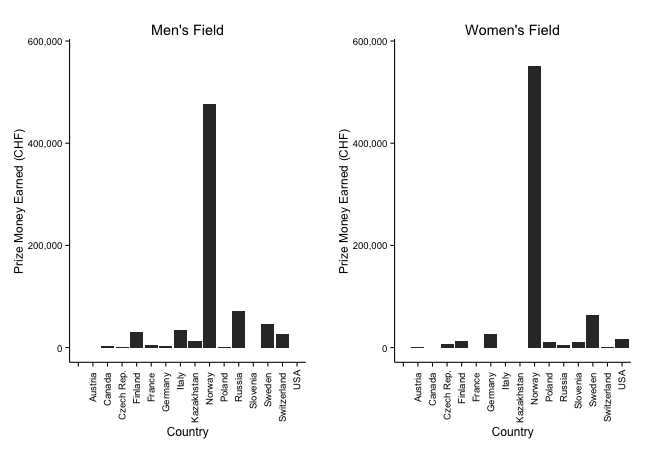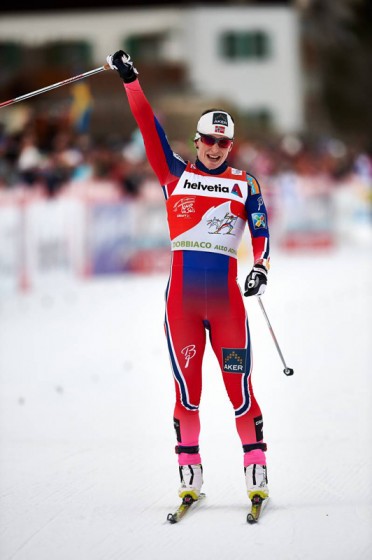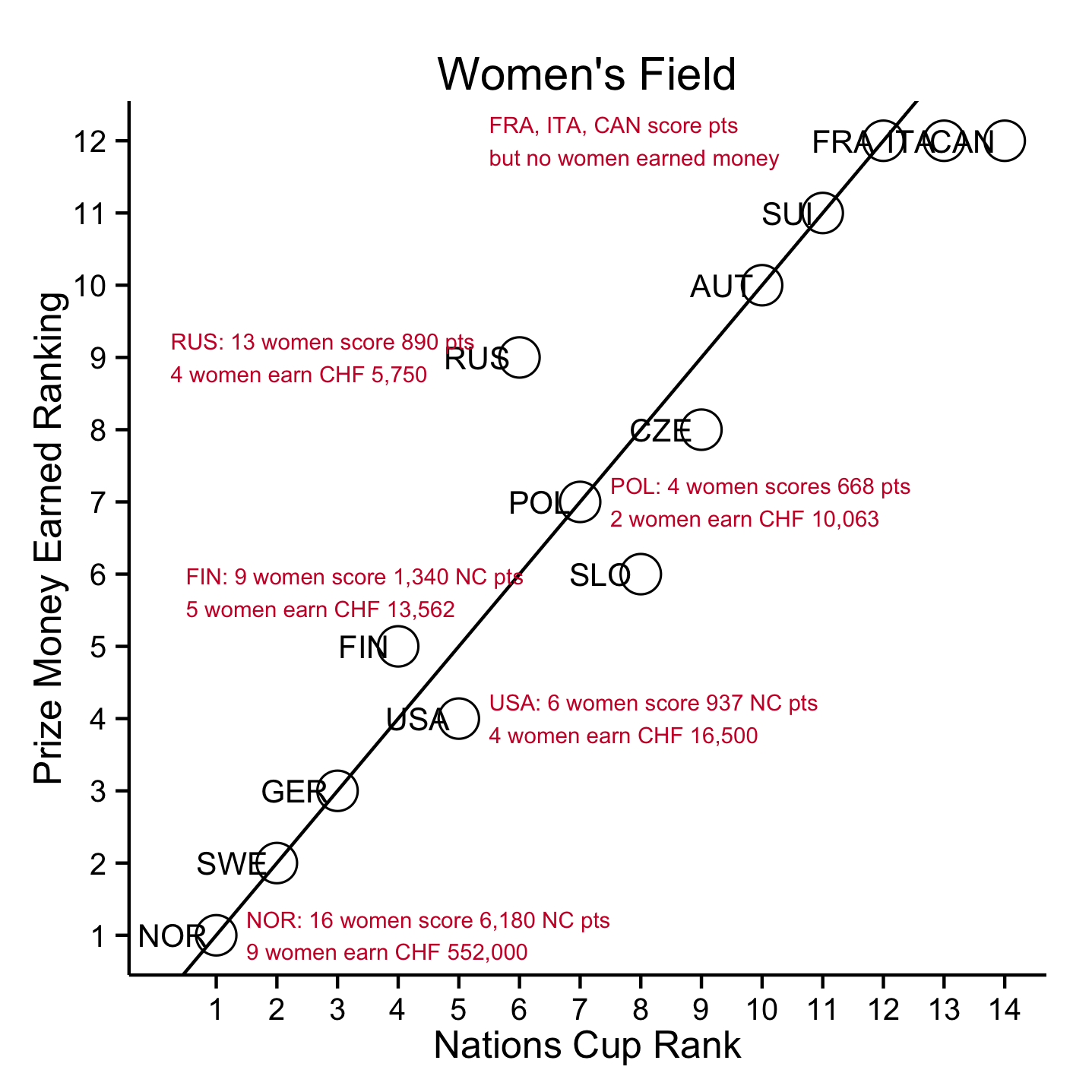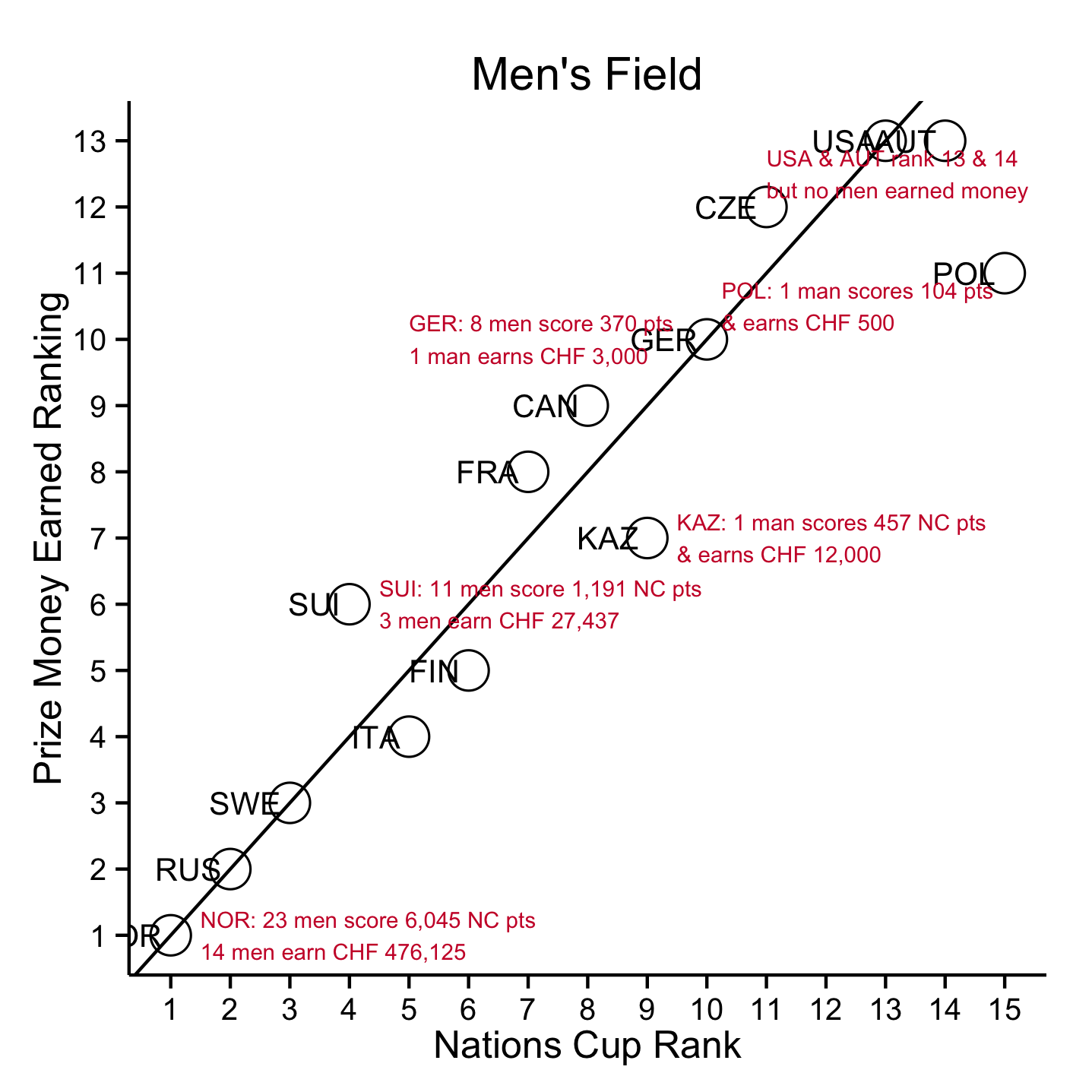
So far this season, with 27 payouts to date, Norwegians Martin Johnsrud Sundby and Marit Bjørgen have earned the most prize money on the FIS Cross Country World Cup.
That’s to be predicted: the two lead the World Cup overall standings. But the extent of their earnings compared to the field is impressive. With 710,000 Swiss Francs paid out so far in each of the men’s and women’s fields, Sundby has taken home 163,000 and Bjørgen a whopping 232,000 – 32% of the total pot.

(Note: as of this publication, the Swiss Franc or CHF is worth about $1.15 in American currency, but that was a recent jump – before mid January, dollars were cheaper than Francs. The Swiss National Bank moved to a longstanding cap implemented in 2011 which had required that 1.20 Euros or more equal a Franc. This led it to immediately jump 42 percent compared to the Euro; markets went into shock.
Because it was all earned before the change, if she transferred it to Norwegian crowns, Bjørgen’s earnings would have equaled roughly $235,000. If they’re still in Francs, they’re now worth more than $265,000.)
The Norwegians have not only succeeded as individuals, but as a country when it comes to prize money. Together, 14 Norwegian men have earned 476,125 Francs, or 67% of the prize money, while a smaller group of women – just nine – have won 552,000 Francs or 77% of the money belonging to the women’s field.
Prize money differs by competition. In most World Cups, money is paid out to the top ten finishers, although the amounts differ. Winning the 15 k classic in Lillehammer, Norway, at the beginning of the season, netted 10,000 Francs; winning the same competition in Davos, Switzerland, a few weeks later netted 15,000. In both cases the payout for tenth place was the same: just 250 Francs.
Then there’s the Tour de Ski. In the seven-stage race, prize money went to just the top three finishers in each competition, usually starting with 1,000 Francs for the winner. Each stage leader also received 1,000 Francs. But at the end, the sprint leaders (Petter Northug and Bjørgen) received an extra 6,000 Francs, second and third place slightly less. And the overall Tour de Ski standings paid out to ten places on a scale from 90,000 Francs down to 1,500.
As has been noted, prize money certainly isn’t the main way that most athletes support themselves. Sponsorships are far more lucrative – not only from local companies and communities which support their hometown athletes, but also by major national and international companies, especially in countries like Norway and Sweden. Cross country skiing has made Bjørgen a millionaire not through prize money, but through sponsorship.
How Good Is Norway?
In men’s and women’s racing combined, Norway has scored 12,225 Nations Cup points (a sum of individual World Cup points and points from relay competitions). That’s three times as many as runner up Sweden (4,002 pts).
14 Norwegian men have won prize money so far this season. By contrast, the U.S. Ski Team roster has 12 athletes with men and women combined.
39 different Norwegian men and women have scored World Cup points so far this season. In its development system, the rosters of Cross Country Canada’s National Development Centres list 40 athletes, including several senior national team members.
Having swept the podium on numerous occasions in both men’s and women’s competition so far this season, it’s logical that Norwegian athletes would have collected the most prize money. But how do other countries stack up?
Women’s Field
The Norwegian women have a particularly strong lock on the prize money. Very few podium positions have gone to anyone not Norwegian – when Nicole Fessel stood on the podium in the Davos 15 k freestyle, it sent shockwaves – and moreover, it’s the same women most weekends. A smaller number of Norwegian women than men take home money, but they take home more of it.
The United States earns above its fifth-place Nations Cup ranking, thanks in large part to Liz Stephen’s Tour de Ski performance. She often has a top time up the final stage, the Alpe Cermis; this year she did not, but made up for it by finishing fifth overall in the seven-stage competition. That netted her 12,500 Francs, more than would be available for a win on most weekends.
Every U.S. woman who has started on the World Cup this season has scored points, except for those who earned their start rights on the SuperTour: Rosie Brennan and Caitlin Gregg. Brennan, however, won money in the team sprint with Ida Sargent in Otepää, Estonia, this past weekend. Besides Stephen, the only other Americans to win prize money in individual racing this season were sprinters Sargent and Kikkan Randall.
Finland ranks ahead of the United States in the Nations Cup, but the Finns have not taken home as much prize money. They have a number of women who are reliable top-ten or top-20 finishers, and in previous seasons would have been getting on the podium periodically. But with the Norwegian podium lock, these women have taken home less prize money. Kerttu Niskanen is the only woman to snag a podium so far, in the Davos 15 k skate.
In previous years a sizeable chunk of prize money would have gone home with Poland’s Justyna Kowalczyk. But the star has been slumping this season, and has earned just over 8,000 Francs. However, Poland is exactly consistent with their team results from last season: the women finished 2014 in seventh place in the Nations Cup standings.
Canada, Italy, and France have scored World Cup points, but not earned prize money.
Men’s Field
How much prize money athletes from a certain country take home roughly corresponds to their Nations Cup ranking. But in some circumstances, there are fairly large deviations from this trend.
Switzerland, for example, earned less prize money than its Nations Cup rank would imply. That’s because they succeed in the Nations Cup of course by the exploits of their star Dario Cologna, but also from a large roster of seasoned distance racers and up-and-coming sprinters. Switzerland was probably helped by the fact that it hosted two World Cup weekends in December, giving them extra start rights with Nations Group skiers. A hefty number of Swiss men showed up in sprint heats in those competitions, but most did not earn prize money, instead finishing in the teens and twenties.
Kazakhstan, on the other hand, earns more money than you might guess. Or rather, Alexey Poltoranin does. The only Kazakh to score points so far this season, he did so in style, placing first and second in two of the Tour de Ski competitions. That netted him a big paycheck, relatively speaking.
The days of Germany as a major threat appear to be over. After a disastrous Olympics, they have started the season with just eight men scoring points and one, Tim Tscharnke, taking home money after he won the Tour de Ski 15 k classic mass start.
Poland’s sole points and prize money come from sprinter Maciej Starega. Starega seems to be having a breakout year, with two World Cup top-tens. But perhaps he serves as a reminder of how un-lucrative prize money is to all but the very best: despite his best season to date and a shot at becoming a recognized name, he’s earned just 500 Francs.
The United States and Austria have scored World Cup points, but with no finishes in the top ten outside of Tour de Ski racing have yet to see their men earn prize money.
Chelsea Little
Chelsea Little is FasterSkier's Editor-At-Large. A former racer at Ford Sayre, Dartmouth College and the Craftsbury Green Racing Project, she is a PhD candidate in aquatic ecology in the @Altermatt_lab at Eawag, the Swiss Federal Institute of Aquatic Science and Technology in Zurich, Switzerland. You can follow her on twitter @ChelskiLittle.





